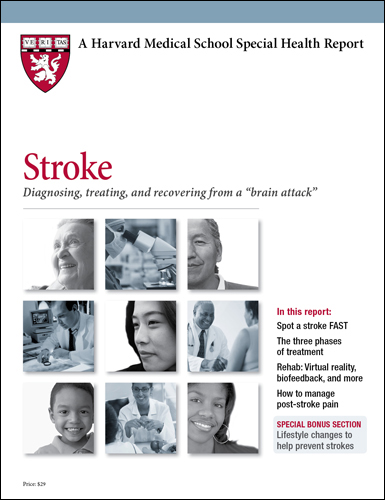Controlling your weight is key to lowering stroke risk
There
is a lot you can do to lower your chances of having a stroke. Even if
you've already had a stroke or TIA ("mini-stroke"), you can take steps
to prevent another.
Controlling
your weight is an important way to lower stroke risk. Excess pounds
strain the entire circulatory system and can lead to other health
conditions, including high blood pressure, diabetes, high cholesterol,
and obstructive sleep apnea. But losing as little as 5% to 10% of your
starting weight can lower your blood pressure and other stroke risk
factors.
Of
course, you'll need to keep the weight off for good, not just while
you're on a diet. The tips below can help you shed pounds and keep them
off:
Move more.
Exercise is one obvious way to burn off calories. But another approach
is to increase your everyday activity wherever you can — walking,
fidgeting, pacing while on the phone, taking stairs instead of the
elevator.
Skip the sipped calories.
Sodas, lattes, sports drinks, energy drinks, and even fruit juices are
packed with unnecessary calories. Worse, your body doesn't account for
them the way it registers solid calories, so you can keep chugging them
before your internal "fullness" mechanism tells you to stop. Instead,
try unsweetened coffee or tea, or flavor your own sparkling water with a
slice of
lemon or lime, a sprig of fresh mint, or a few raspberries.
Eat more whole foods.
If you eat more unprocessed foods — such as fruits, vegetables, and
whole grains — you'll fill yourself up on meals that take a long time to
digest. Plus, whole foods are full of vitamins, minerals, and fiber and
tend to be lower in salt — which is better for your blood pressure,
too.
Find healthier snacks.
Snack time is many people's downfall — but you don't have to skip it as
long as you snack wisely. Try carrot sticks as a sweet, crunchy
alternative to crackers or potato chips, or air-popped popcorn (provided
you skip the butter and salt and season it with your favorite spices
instead). For a satisfying blend of carbs and protein, try a dollop of
sunflower seed
butter on apple slices.
For more information on lifestyle changes you can make to help prevent a stroke, buy Stroke, a Special Health Report from Harvard Medical School.
|
Use the labels in the right column to find what you want. Or you can go thru them one by one, there are only 32,362 posts. Searching is done in the search box in upper left corner. I blog on anything to do with stroke. DO NOT DO ANYTHING SUGGESTED HERE AS I AM NOT MEDICALLY TRAINED, YOUR DOCTOR IS, LISTEN TO THEM. BUT I BET THEY DON'T KNOW HOW TO GET YOU 100% RECOVERED. I DON'T EITHER BUT HAVE PLENTY OF QUESTIONS FOR YOUR DOCTOR TO ANSWER.
Changing stroke rehab and research worldwide now.Time is Brain! trillions and trillions of neurons that DIE each day because there are NO effective hyperacute therapies besides tPA(only 12% effective). I have 523 posts on hyperacute therapy, enough for researchers to spend decades proving them out. These are my personal ideas and blog on stroke rehabilitation and stroke research. Do not attempt any of these without checking with your medical provider. Unless you join me in agitating, when you need these therapies they won't be there.
What this blog is for:
My blog is not to help survivors recover, it is to have the 10 million yearly stroke survivors light fires underneath their doctors, stroke hospitals and stroke researchers to get stroke solved. 100% recovery. The stroke medical world is completely failing at that goal, they don't even have it as a goal. Shortly after getting out of the hospital and getting NO information on the process or protocols of stroke rehabilitation and recovery I started searching on the internet and found that no other survivor received useful information. This is an attempt to cover all stroke rehabilitation information that should be readily available to survivors so they can talk with informed knowledge to their medical staff. It lays out what needs to be done to get stroke survivors closer to 100% recovery. It's quite disgusting that this information is not available from every stroke association and doctors group.
Saturday, January 16, 2016
Controlling your weight is key to lowering stroke risk
This is way too simplistic, I was in probably the best shape of my life and because of that is why I survived. They should come up with easy tests to measure your unstable plaque and the hardness of your arteries. Those are the real triggers to most strokes. I wish people would learn direct cause and effect.
Subscribe to:
Post Comments (Atom)

No comments:
Post a Comment